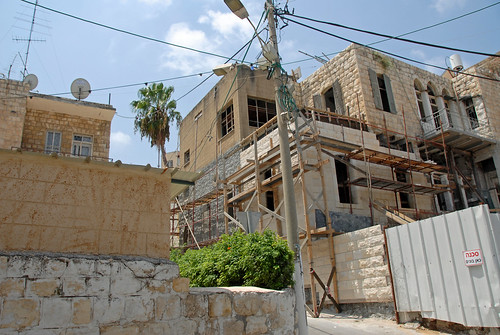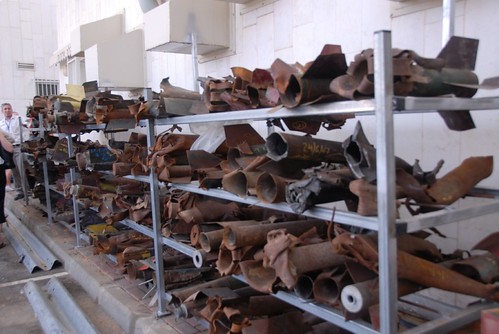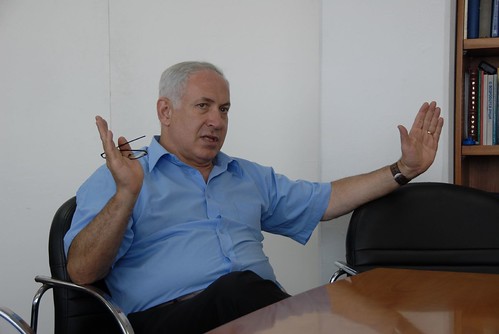The Israel Paradox: A leader with a 9% approval rating seeks to give away the store – and the Parliament is squarely behind him

August 9, 2007
A major idiosyncrasy (to Americans) of Israeli politics is the fact that, though Israeli Prime Minister Ehud Olmert currently enjoys an approval rating solidly in the single digits, he is perhaps more secure in his position at the top of the Israeli government than he has been at any time in his tenure as Prime Minister. Presiding over a broad coalition of parliamentarians, Olmert is sticking to his guns (as inapt a metaphor as can possibly be applied) and is doing his best to reinvigorate the Middle East “peace” process by repeating mistakes that made Israel’s position so precarious in the first place.
As Caroline Glick, Israel’s more dour version of Ann Coulter, said in a recent Jerusalem Post column, “Olmert and his ministers pursue diplomatic and security goals that bear no relation to the regional and global realities facing Israel.” The man whom few expected to make it through last year’s disaster of a “war” (the 33-day battle with the Iranian proxies Hezbollah in Lebanon) is continuing down the path that not only endangered Israel’s national security and led, in part, to that war in the first place, but that caused him to be looked at as a farce of a leader by over 90% of his own population.
 |
Amazingly, Olmert then (as now) did not comprehend the obvious: the conflict he then sought, and now seeks, to dampen through unilateral concession was escalated to its current scale by the very policy he is currently advocating. In the Gaza Strip, Israel (under Ariel Sharon) unilaterally withdrew to the borders of the town of Sederot, leaving the Palestinians there to their own devices (although with power still provided to the territory by a southern Israeli power plant); under Olmert last November, a cease-fire agreement was reached between the two entities.
 |
The result? Since the cease-fire was agreed to, the Palestinians in the Gaza Strip have launched over 330 homemade Qassam rockets (fashioned from water pipes – no wonder Gaza has no infrastructure – and rebar, and filled with nails and ball bearings) at Sederot – a town populated entirely by civilians – as well as at the plant which provides Gaza with its power. Further, in June of last year a tunnel from the Strip to an outpost on the border was completed (a three-year project), which allowed Hamas terrorists to infiltrate IDF defenses and to kidnap Cpl. Gilad Shalit. Over a year later, Shalit is still being held captive.
Olmert’s detachment from reality is palpable. In the south, he has released funds to the Fatah party, which is no longer in power after the dual blows of their loss to Hamas in an election last year, and their being thrown off of Gaza Strip high rises by the same in a recent uprising. In the north and east, he says, “live millions of people who want tranquility, a quality of life and quiet – just like we do.”
This is, of course, an entirely wrongheaded point of view, and is one which Americans such as Condoleezza Rice are guilty of holding, as well. The attributing of Western ideals and values to a foreign population is entirely erroneous, and is, in large part, the source of many of the ills not only in Palestine, but in areas like Iraq, as well.
While Iran is, to many, a case in and of itself, the sense among the reality-based Israeli leadership is that it is the engine driving the Jewish state’s ever-growing security problems. Katyusha rockets, small arms, and Korean-designed surface-to-surface missiles all reach both Hamas and Hezbollah via the Persian state, and others in the area – such as Syria and Egypt – are falling further under its influence, as well.
 |
Dan Diker, a senior policy analyst at the Jerusalem Center for Public Affairs (headed by former Ambassador Dore Gold), had a similar view. As he told me, “Iran is the engine driving the current battle. They are funding our enemies, equipping them, and – in an unprecedented move – they have publicly called for the destruction of a fellow United Nations member state. And nothing is being said!”
Diker presented a map, assembled by his staff with the JCPA’s Defensible Borders Project, which showed the potentially deadly outcome of the combination of further unilateral withdrawal to the so-called “1967 borders” and the modern, far-reaching weapons that Iran has provided to the Palestinian “resistance.”
Olmert’s Defense Minister, former PM Ehud Barak, recently unveiled a plan to put in place a “missile defense” system which he envisions as being able to stop anything from ballistic missiles to homemade Qassam rockets – a sheer fantasy at best – which he claims will make vacating Judea, Samaria, and the Golan Heights both painless and danger-free. However, in presenting this, he glosses over the fact – shown by last year’s Lebanon “war,” in which the cross-bay city of Haifa was bombarded with missiles and with Katyusha rockets from a territory unilaterally abandoned by Israel (under Barak) in 2000 – that territory must be held as a buffer before any such defense can even begin to be put in place.
As Ambassador Gold put it, “We cannot give up Jerusalem, and we cannot give up our presence in the territories. Uprooting the settlers [from the areas near Gaza] was painful enough; we cannot put our population in further jeopardy by eliminating the one thing that keeps us most safe – our presence in those areas, both as security and as a deterrent to attack.”
Such sense appears to be falling on deaf ears with regard to Olmert and his ‘coalition.’ When meeting with her in Jerusalem, I asked his spokesperson, Miri Eisen, what her response would be to those who say that unilaterally making concessions is a well-known sign of weakness to Israel’s opponents, and, like in Lebanon and Gaza, would serve only to embolden the fighters to strike harder.
Her response? “We know that it is not weak, because we know that there is strength in being able to make concessions even when it has not worked before.”
All in all, that is not overly encouraging.
Labels: Israel
